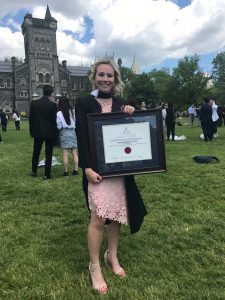Hear from Ethics, Society & Law Students

What are you studying now?
The Trinity One Ethics stream was a highlight of my time as an undergraduate student at the University of Toronto, as it helped me with the transition into university, as well as provided me with skills and relationships I still have today. I looked forward to my Trinity One seminars every week as they were small classes which were highly engaging, heavily discussion based, and focused on what I was interested in studying while at university. I was able to meet like-minded students with similar interests to me, and I was able to create friendships which I will carry with me long past my time in university. Due to the small class size I was able to develop personal relationships with my professors starting in first-year, which I was able to build throughout my undergrad. My professors in Trinity One provided me with tools that allowed me to succeed in my undergrad, through providing feedback and advice on my writing, and helping me work through and build on the course material and questions that arose. I was required to critically analyze the course material as well as my own writing and thoughts, which allowed me to achieve academic accomplishments I thought were beyond my abilities. Trinity One solidified and confirmed interests I held, as well as introduced new interests and areas to pursue academically and professionally.
In my undergrad I studied a double major in Bioethics and Ethics, Society, and Law. I am starting at Ryerson University in the fall to pursue my Master of Arts in Criminology and Social Justice and will be applying to law school this fall. My research interests and what I hope to continue studying during my Master’s, as well as what I hope to pursue professionally, were sparked in my first-year in Trinity One. I was introduced to differing concepts of justice, the impact and implications of our criminal justice system, as well as the marginalization and lack of access to our criminal justice system and institutions of certain communities and groups. I am grateful to Trinity One for introducing me to these concepts so early in my academic career and providing me with confidence and skills both academically and personally that I will continue to carry with me.

Trinity One student Chelsea Tao talks about the dynamics of privilege and oppression from TRN171Y: Ethics and the Public Sphere.
“In order to analyze the ethics of today’s society and its impacts on the people living in it, we must turn our attention to the pervading spheres of inequality.”
“How can we approach such a dense and complex topic in a way that respects individual experiences?”
As you read this, consider the fact that you, as well as seven and a half billion other individuals, are living in a world shaped by a remarkable 200,000 years of human history. Contoured and carved, built and produced, forged from incredible achievements as well as the horrors of human evil. As we exist today, the impacts of histories such as colonization, war, slavery, national identity, rights movements, and much more permeate every aspect of our lives through the dynamics of power and oppression. In order to analyze the ethics of today’s society and its impacts on the people living in it, we must turn our attention to the pervading spheres of inequality.
How can we approach such a dense and complex topic in a way that respects individual experiences? As a class we committed to a model of profound listening and active engagement with the material. We do so by drawing from our own observations of inequality in contemporary life. Through this process we realized how conferred privileges and socially determined discrimination affect and sometimes regulate facets of daily life. Our socioeconomic status, sex, sexual orientation, race, physical and mental health, and more influence the way we experience and participate in a socially constructed world in which social benefits are unequally distributed.
Privilege and oppression occur within systems and institutions such as schools, workplaces, families, the media, and economic models. We must ask questions about who controls the narrative of society, what factors come into play when we think about the “defaults” that normalize behaviour in our society, and how people who don’t fit into this mould are treated.
For example, consider inequalities of physical accessibility: public buildings and spaces in Canada often offer stairs as the sole means of travelling between floors, ultimately making wheelchair use impossible and barring certain individuals from participating fully in society. Access inequality extends far beyond this example and into spheres of the racialized, the gendered, the dis-abled, and more. These are all ways that make some people less part of society than others.
As we moved through our discussions of applied ethics it became increasingly clear that dynamics of privilege create a web of relations that in turn construct a social reality that includes obstacles to equality. It is our duty to investigate the physical world and ask how these spaces influence our interactions with one another and how we can remove obstacles to full participation in social life. Just as we live in a world shaped by the decisions of those before us, we are responsible for understanding the dynamics that shape our world, and to make it better for those who will come after us.